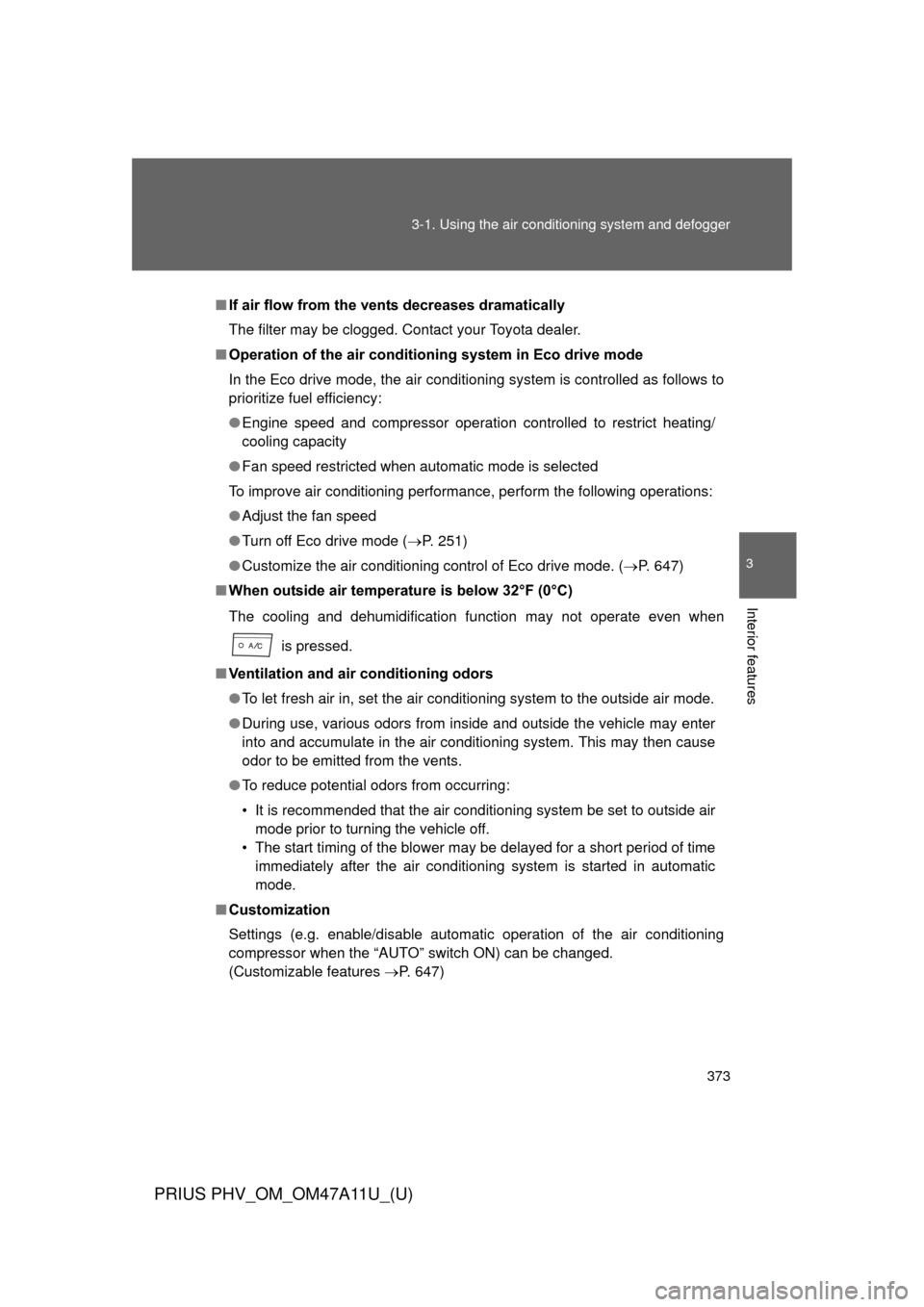Page 373 of 692

373
3-1. Using the air conditioning system
and defogger
PRIUS PHV_OM_OM47A11U_(U)
3
Interior features
■If air flow from the vents decreases dramatically
The filter may be clogged. Contact your Toyota dealer.
■ Operation of the air conditio ning system in Eco drive mode
In the Eco drive mode, the air conditioning system is controlled as follows to
prioritize fuel efficiency:
● Engine speed and compressor operation controlled to restrict heating/
cooling capacity
● Fan speed restricted when automatic mode is selected
To improve air conditioning performance, perform the following operations:
● Adjust the fan speed
● Turn off Eco drive mode ( P. 251)
● Customize the air conditioning control of Eco drive mode. ( P. 647)
■ When outside air temperature is below 32°F (0°C)
The cooling and dehumidification function may not operate even when
is pressed.
■ Ventilation and air conditioning odors
●To let fresh air in, set the air conditioning system to the outside air mode.
● During use, various odors from inside and outside the vehicle may enter
into and accumulate in the air conditioning system. This may then cause
odor to be emitted from the vents.
● To reduce potential odors from occurring:
• It is recommended that the air conditioning system be set to outside air
mode prior to turning the vehicle off.
• The start timing of the blower may be delayed for a short period of time immediately after the air conditioning system is started in automatic
mode.
■ Customization
Settings (e.g. enable/disable automatic operation of the air conditioning
compressor when the “AUTO” switch ON) can be changed.
(Customizable features P. 647)
Page 426 of 692

426 3-5. Other interior features
PRIUS PHV_OM_OM47A11U_(U)
Safety information for Safety ConnectImportant! Read this information before using Safety Connect.
■ Exposure to radio frequency signals
The Safety Connect system installed in your vehicle is a low-power
radio transmitter and receiver. It receives and also sends out radio
frequency (RF) signals.
In August 1996, the Federal Communications Commission (FCC)
adopted RF exposure guidelines with safety levels for mobile wire-
less phones. Those guidelines are consistent with the safety stan-
dards previously set by the following U.S. and international
standards bodies.
● ANSI (American National Stand ards Institute) C95.1 [1992]
● NCRP (National Council on Ra diation Protection and Measure-
ment) Report 86 [1986]
● ICNIRP (International Commiss ion on Non-Ionizing Radiation
Protection) [1996]
Those standards were based on comprehensive and periodic eval-
uations of the relevant scientific literature. Over 120 scientists,
engineers, and physicians from universities, and government
health agencies and industries reviewed the available body of
research to develop the ANSI Standard (C95.1).
The design of Safety Connect complies with the FCC guidelines in
addition to those standards.
Page 429 of 692
Maintenance and care4
429
PRIUS PHV_OM_OM47A11U_(U)
4-1. Maintenance and careCleaning and protecting the vehicle exterior ......... 430
Cleaning and protecting the vehicle interior .......... 433
4-2. Maintenance Maintenance requirements .................. 436
General maintenance....... 439
Emission inspection and maintenance (I/M)
programs........................ 444
4-3. Do-it-yourself maintenance Do-it-yourself service precautions .................... 445
Hood ................................ 448
Positioning a floor jack ..... 451
Replacing the tire ............. 454
Engine compartment ........ 464
12-volt battery .................. 476
Tires ................................. 481
Tire inflation pressure ...... 490
Wheels ............................. 494
Electronic key battery....... 497
Checking and replacing fuses .............................. 499
Light bulbs........................ 511
Page 431 of 692

431
4-1. Maintenance and care
PRIUS PHV_OM_OM47A11U_(U)
4
Maintenance and care
■
Note for a smart key system
If the door handle becomes wet while the electronic key is within the effec-
tive range, the door may lock and unlock repeatedly. Place the key in a posi-
tion 6 ft. (2 m) or more separate from the vehicle while the vehicle is being
washed. (Take care to ensure that the key is not stolen.)
■ Aluminum wheels
●Remove any dirt immediately by using a neutral detergent. Do not use
hard brushes or abrasive cleaners. Do not use strong or harsh chemical
cleaners.
Use the same mild detergent and wax as used on the paint.
● Do not use detergent on the wheels when they are hot, for example after
driving for long distance in the hot weather.
● Wash detergent from the wheels immediately after use.
■ Bumpers
Do not scrub with abrasive cleaners.
CAUTION
■When washing the vehicle
Do not apply water to the inside of the engine compartment. Doing so may
cause the electrical components etc. to catch fire.
■ While charging
Do not wash the vehicle.
Doing so may cause the electrical components to malfunction or catch fire
and also you may get an electric shock that may result in death or serious
injury.
■ Precautions regardin g the exhaust pipe
Exhaust gasses cause the exhaust pipe to become quite hot.
When washing the vehicle, be careful not to touch the pipe until it has cooled
sufficiently, as touching a hot exhaust pipe can cause burns.
Page 438 of 692
438 4-2. Maintenance
PRIUS PHV_OM_OM47A11U_(U)
CAUTION
■If your vehicle is not properly maintained
Improper maintenance could result in serious damage to the vehicle and
possible serious injury or death.
■ Handling of the 12-volt battery
●Engine exhaust, some of its constituents, and a wide variety of automobile
components contain or emit chemicals known to the State of California to
cause cancer and birth defects and other reproductive harm. Work in a
well ventilated area.
● Oils, fuels and fluids contained in vehicles as well as waste produced by
component wear contain or emit chemicals known to the State of Califor-
nia to cause cancer and birth defects or other reproductive harm. Avoid
exposure and wash any affected area immediately.
● 12-volt battery posts, terminals and related accessories contain lead and
lead compounds which are known to cause brain damage. Wash your
hands after handling. ( P. 476)
Page 439 of 692
439
4-2. Maintenance
PRIUS PHV_OM_OM47A11U_(U)
4
Maintenance and care
General maintenance
Engine compartment
ItemsCheck points
Brake fluid Is the brake fluid at the correct
level? (
P. 472)
Engine/power control unit coolant Is the engine/power control unit
coolant at the correct level?
(P. 469)
Engine oil Is the engine oil at the correct
level?
(P. 465)
Exhaust system There should not be any fumes or
strange sounds.
Radiator/condenser The radiator and condenser
should be free from foreign
objects. (
P. 471)
Washer fluid Is there sufficient washer fluid?
(P. 474)
Listed below are the general maintenance items that should be per-
formed at the intervals specified in the “Owner’s Warranty Informa-
tion Booklet” or “Owner’s Manual Supplement/Scheduled
Maintenance Guide”. It is recommended that any problem you notice
should be brought to the attention of your Toyota dealer or qualified
service shop for advice.
Page 442 of 692
442 4-2. Maintenance
PRIUS PHV_OM_OM47A11U_(U)
Vehicle exterior
ItemsCheck points
Doors • Do the doors operate smoothly?
Engine hood • Does the engine hood lock sys-
tem work properly?
Fluid leaks • There should not be any signs of
fluid leakage after the vehicle has
been parked.
Tires • Is the tire inflation pressure cor-
rect?
• The tires should not be dam- aged or excessively worn.
• Have the tires been rotated according to the maintenance
schedule?
• The wheel nuts should not be loose.
Windshield wipers/rear window
wiper • The wiper blades should not show
any signs of cracking, splitting,
wear, contamination or deforma-
tion.
• The wiper blades should clear the windshield/rear window without
streaking or skipping.
Page 445 of 692
445
PRIUS PHV_OM_OM47A11U_(U)
4
Maintenance and care
4-3. Do-it-yourself maintenance
Do-it-yourself ser vice precautions
If you perform maintenance by yourself, be sure to follow the correct
procedure as given in these sections.
ItemsParts and tools
12-volt battery condition (P. 476)• Grease
• Conventional wrench
(for terminal clamp bolts)
Brake fluid level ( P. 472)
• FMVSS No.116 DOT 3 or SAE
J1703 brake fluid
• Rag or paper towel
• Funnel (used only for adding brake fluid)
Engine/power control unit coolant
level ( P. 469)
• “Toyota Super Long Life Coolant”
or a similar high quality ethylene
glycol-based non-silicate, non-
amine, non-nitrite and non-borate
coolant with long-life hybrid
organic acid technology
For the U.S.A.:
“Toyota Super Long Life Cool-
ant” is pre-mixed with 50% cool-
ant and 50% deionized water.
For Canada:
“Toyota Super Long Life Cool-
ant” is pre-mixed with 55% cool-
ant and 45% deionized water.
• Funnel (used only for adding cool- ant)